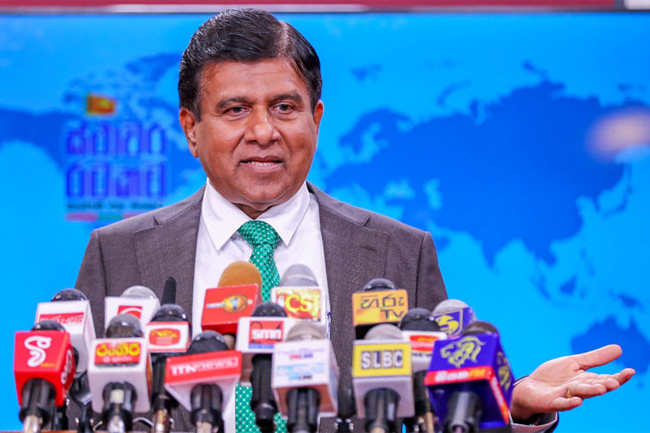Sri Lanka to introduce new legislative framework to regulate microfinance institutions
December 5, 2023 10:02 am
The Minister of Justice, Prison Affairs & Constitutional Reforms, Wijeyadasa Rajapakshe has unveiled plans to introduce a new legislative framework aimed at regulating microfinance institutions operating within the country.
Expressing deep concern regarding the unregulated status of certain microfinance entities, the lawmaker emphasized the necessity for decisive measures.
He underscored the intention to establish an independent regulatory institution, distinct from the Central Bank, dedicated to the oversight and effective regulation of microfinance entities.
Minister Rajapakshe made these remarks on Monday (Dec.04) during a press briefing at the President’s Media Centre (PMC), themed ‘Collective path to a stable Country’.
Rajapakshe further commented that the Justice Ministry presently oversees the operational responsibilities of 21 institutions, encompassing a diverse range of subjects, including law enforcement and law reform. With a caseload exceeding 1.1 million in the courts across the country, concerted efforts have been undertaken in recent times to mitigate delays in case adjudication.
He added that substantial measures have been implemented to address the backlog and streamline the judicial process, with a particular focus on the establishment and operation of conciliation boards aimed at facilitating the expeditious resolution of select cases.
The minister further stated that globally recognized expedited methods for resolving criminal cases stand in contrast to our nation’s outdate legal framework, resulting in prolonged durations for case resolutions. He said the delay in criminal proceedings represents a substantial issue, jeopardizing the administration of justice and leaving all parties involved without timely recourse.
Rajapakshe mentioned that in order to address this challenge, a draft law aimed at expediting the resolution of criminal cases is currently under development and is slated for submission to Parliament in January.
“In advanced jurisdictions, there is a paradigm shift towards non-custodial measures for individuals involved in minor offenses. Recognizing that incarceration, in many instances, is not the most suitable recourse, the new legal framework being proposed aims to explore alternatives. Notably, some individuals find themselves incarcerated due to societal oversights, and the proposed legislation acknowledges this by providing avenues for release on bail conditions. This approach aims to strike a balance between societal concerns and individual liberties, fostering a more nuanced and equitable criminal justice system.”
Speaking further on the Office of Missing Persons which currently manages a caseload of approximately 14,000 complaints, Rajapakshe highlighted that investigations for 4,795 complaints have successfully been concluded, reflecting a substantial improvement in case resolution which stood at 62 by the time he assumed duties. All outstanding complaints lodged with the Office of Missing Persons are slated for resolution by the coming year, the minister added.
In addition, to fortify and enhance the efficiency of the judicial process, Rajapakshe said a comprehensive set of eight new bills is set to be submitted to Parliament.
“Efforts are underway to establish a reconciliation society within each village, where government officials and politicians do not play a direct role. The activities of these societal initiatives, referred to as reconciliation societies, are guided by the preferences of elders and religious leaders within the respective villages. The responsibilities encompass the independent execution of tasks such as infrastructure development, including road construction and provision of electricity, rendering political involvement unnecessary.
“The villagers take charge of organizing religious festivals, sports events and cultural celebrations, fostering a sense of community ownership and participation. The overarching vision is to seamlessly integrate each Grama Seva Division into a unified network, operating independently from external interference. The reconciliation society is entrusted with safeguarding the welfare and interests of the village, thereby ensuring the preservation and well-being of the community.
“Presently, widespread discourse revolves around the state of the country’s economy, which has been adversely affected by various factors. The extensive toll on lives and property incurred during Prabhakaran’s war and the destructive actions of the JVP, including the burning of buses, transformers and over 25 courts, have significantly impacted the economic landscape. The repercussions of these incidents continue to reverberate, influencing the nation’s economic trajectory.
“One pressing issue contributing to economic challenges is the unregulated proliferation of microfinance institutions, perceived as a substantial concern in the country. The absence of legal frameworks and regulatory oversight, coupled with the lack of registration with the Central Bank, has created an environment where individuals find it challenging to secure loans through conventional financial institutions due to their stringent rules. Consequently, many turn to microfinance institutions, exacerbating the existing economic predicament.
“To address this concern, there is a pressing need to establish a dedicated regulatory body, separate from the Central Bank, to oversee and govern microfinance institutions. Efforts are underway to introduce comprehensive laws aimed at regulating these entities and mitigating the potential adverse effects they pose to the country’s economic stability. The goal is to instate a regulatory framework that ensures responsible and accountable practices within the microfinance sector, thereby contributing to the overall economic well-being of the nation.”














